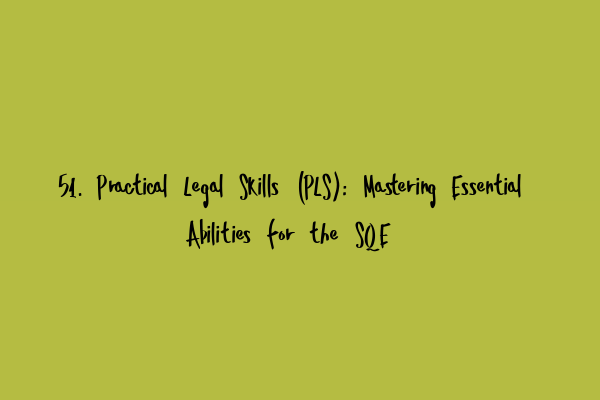51. Practical Legal Skills (PLS): Mastering Essential Abilities for the SQE
Welcome to another informative blog post from SQE Exam Law! In this article, we will be diving deep into the practical legal skills (PLS) required to master the essential abilities for the Solicitors Qualifying Examination (SQE). The SQE is a rigorous exam that tests aspiring solicitors on their knowledge and application of key legal principles. By developing and honing your practical legal skills, you will enhance your chances of success in this important exam.
Mandatory Skills for the SQE
Before we delve into the practical legal skills, it’s important to note that the SQE assesses candidates on a set of mandatory skills. These skills include legal research, legal writing, legal drafting, case and matter analysis, legal problem-solving, client interviewing and advising, and advocacy. Mastering these skills is crucial for success in the SQE and will also set you up for a successful career as a solicitor.
Developing Legal Research Skills
Legal research is the foundation for any legal analysis and decision-making. To excel in this area, it’s important to learn effective research techniques, such as utilizing online legal databases, understanding the hierarchy of legal sources, and developing strong analytical skills. Our article on SQE Sample Papers: Practice for Exam Success will provide you with valuable practice materials to enhance your legal research skills.
Mastering Legal Writing and Drafting
Clear and concise legal writing is a skill that every solicitor must possess. From drafting legal opinions to preparing contracts, your ability to communicate effectively through writing will greatly impact your success in the SQE. To improve your legal writing, consider reading legal texts and practicing writing concise, well-structured arguments. Our article on Focus Areas in SQE1 and SQE2: Mastering Key Concepts will provide you with additional insights into the key concepts you need to understand for the SQE.
Enhancing Case and Matter Analysis Skills
Analyzing complex cases and matters is a fundamental skill for a solicitor. You should be able to identify key legal issues, analyze relevant facts, and apply the law to provide accurate advice. To enhance your case and matter analysis skills, consider participating in SQE mock debrief sessions. Our article on SQE Mock Debrief Sessions: Critical Steps for Improvement will guide you through the critical steps for improvement.
Developing Legal Problem-Solving Skills
Being a successful solicitor requires the ability to think critically and solve complex legal problems. You should be able to identify legal issues, analyze the available options, and propose practical solutions. The practice of working through SQE sample papers can play a crucial role in developing your problem-solving skills. Check out our article on Practicing with SQE Sample Papers: Elevating Your Scores to learn more about the benefits of practicing with sample papers.
Client Interviewing and Advising
Client interaction is an integral part of being a solicitor. You should be able to conduct effective client interviews, gather relevant information, and provide valuable advice. Developing strong communication and active listening skills is essential for success in this area. Additionally, consider enhancing your advocacy skills to effectively represent your clients. A comprehensive preparation strategy should include adjustments based on mock performance. Read our article on Adjusting Your SQE Strategy Based on Mock Performance for valuable tips on modifying your study approach based on your mock results.
Conclusion
Mastering practical legal skills is vital for success in the SQE and for a fulfilling career as a solicitor. By developing your legal research, writing, drafting, case analysis, problem-solving, client interviewing, and advocacy abilities, you will be well-prepared to excel in the complex and demanding world of law. Remember to practice regularly using SQE sample papers and adjust your studying approach based on mock performance. Your dedication and hard work will pay off as you embark on your journey to becoming a qualified solicitor through the SQE.
